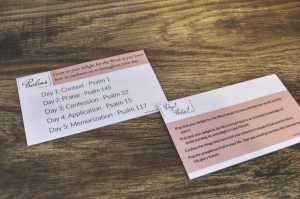Disclosure: Some of the links below may be affiliate links. That means, I may earn money or products from the companies mentioned in this post. Read my full disclosure here.
As we seek to look to Christ in all things, we must be diligent students of the word. Yet, many new believers struggle with even knowing where to start in understanding the Bible. For a busy mama who struggles to find the time to take a shower, this feels daunting, yet seeking to learn how to understand the Bible as a beginner is both doable and necessary.
Can I Ever Understand the Bible?
Now we have received not the spirit of the world, but the Spirit who is from God, that we might understand the things freely given us by God. 1 Corinthians 2:12
First Corinthians chapter two shows us that we are not capable of understanding spiritual things outside of the work of the Holy Spirit. As we seek to understand the Bible better, we must diligently pray for the Holy Spirit to reveal to us the truth, beauty, and power contained within the Scriptures. This, however, does not mean that we are not required to do any work. A disciplined faith is one that is dedicated to reading and growing in the knowledge of the things of God. If you are seeking how to understand the Bible as a beginner, you must pray and then actually read it!
What Should I Read First?
I like to follow a Bible reading plan. There are many great plans out there, but I prefer the 5-day method as it gives me time to catch up or go deeper on the weekend. Other popular reading plans include:
Discipleship Journal Reading Plan from the Navigators
How to Understand the Bible for Beginners
As you begin reading your Bible, here are my top tips for a better understanding of what you’ve read.
Keep God at the Center of Your Study
In the Bible, we learn who God is and what He has done (Hebrews 1:1-3). We learn about the Gospel and find instruction that changes us (2 Timothy 3:14-17). Approach your Bible study thinking less about yourself and thinking more about God. One way I do this is to highlight or write down everything I learn about God from a passage.
Ask Questions
You may think you understand a passage completely, but still, always try to find more questions. What does a certain word actually mean? If a place is mentioned, do you know where it is located? When you learn to ask good questions, you find yourself thinking deeply on and learning more about the passage. Learn more about thinking deeply or meditating on the Word here.
Write a Summary
Consider writing what the passage says in your own words. This will not have the same authority as the Bible, but it can be helpful practice. When you rewrite the passage, you have to consider the main point.
Seek Outside Help
After you’ve prayed, seen God in the passage, asked questions, and wrote a summary, look to other places in the Bible for help understanding the passage. Many Bibles include footnotes and references to other similar verses. If seeing the words in another part of the Bible doesn’t help, turn to a trusted mentor, pastor, or commentary.
Bible Study Tools for Beginners
As you continue to grow in the faith, daily reading and Bible study should continue. Here are some of my favorite Bible study tools for beginners.
“Fix Your Eyes” A free Bible study journal for busy moms: This printable Bible journal provides an easy system and journal pages to make sure you have an intentional plan each time you open the Word. The journal is free to download

Redeeming Routines: Portable guides that make Scripture meditation doable for busy moms. These guides allow you to listen to the Word, think deeply on it, spend time in prayer, and consider how to apply the passage – all while going about your daily routines!
Bible Studies from the Daily Grace Co: The Daily Grace Co makes beautiful Bible studies, journals, and other tools to help you dig into the Word
Women of the Word: How to Study the Bible with Both Our Hearts and Our Minds: This book by Jen Wilkin is an incredibly practical guide for women (and men!) who are wanting to start going deeper in studying and understanding the Bible. Jen is one of my favorite Bible teachers and she also has many wonderful Bible studies.
ESV Study Bible: The ESV is my preferred Bible translation, and the study Bible version comes with great commentary to help you better understand the passage you are reading.
Learn to study the Bible with the Abide Method from Risen Motherhood: Risen Motherhood (a popular podcast for Christian moms) has a free tutorial and printable worksheets to guide women through the Abide Method, their method of studying the Bible
How to Go Deeper in Bible Study – Desiring God: In this article, John Piper wrote a sweet reply to a 13-year-old who was seeking to go deeper in studying the Bible.
If you are looking for ways to incorporate spiritual disciplines like Bible study and prayer into your busy life as a mom, be sure to take the 30 Days of Looking to Jesus Challenge. Find simple, daily steps to help you look to Jesus, even in the midst of the mundane.
Review of Another Bible Study Tool – How to Understand the Bible in 30 Days
I was recently given the opportunity to read the thirtieth anniversary expanded edition of Max Anders’ 30 Days to Understanding the Bible. The goal of his book is to provide a tool for beginners to gain a foundational overview of the important events and doctrines of the Bible.
How to Understand the Bible for Beginners: Max Ander’s Method
Using a lot of repetition to encourage memory, the first two-thirds of the book teaches you the important places, people, and events of the Bible. Anders says that “if you want to learn to understand the Bible, you must first learn how the Bible is put together.” (pg 4) I was initially saddened to hear no mention of the Holy Spirit’s role in our understanding, however, I found that the goal of this section was not to increase spiritual understanding but to help in learning the general structure of the Bible and how to read it. He later says,
“Man’s natural ability to grasp and embrace the information in the Bible is limited. Much of it is spiritual information that man does not readily understand or accept. To overcome this fact, the Holy Spirit gradually illumines the receptive mind to understand and embrace more and more of the Bible, as the Christian matures in his or her spiritual walk.” (pg 194)
After spending many days learning summaries of the different sections of the Bible, I greatly enjoyed a short change of pace in reading the section on understanding the poetic passages in the Scriptures. Learning how to understand the types of literature and writing helps us understand the context of passages and how to interpret the meaning of the passage. Different literary contexts and techniques may mean reading a passage literally or metaphorically.
Finally, the book ends with a review of 10 major subjects or doctrines into which Anders believes you can divide everything the Bible teaches. This is important as the Bible is not just dates and events. Anders says,
“The Bible is more than history. If you would know the Bible, you must go beyond the historical study of people, places, and events, and learn about its teachings; taking that plunge is not easy.” (Pg 183)
Praise be to God for the Holy Spirit and His work in our lives and in the lives of the many Bible teachers who have come before us!
Thoughts on 30 Days to Understanding the Bible
I commend Max Anders’ goal for this book in providing an overview to help beginners know how to better understand the Bible. The mature believer can absolutely find great information here as well as refresh their memory on the timeline and important events of the Bible. Unfortunately, I didn’t find the extreme repetitiveness in the memorization exercises to be helpful, but I do know that it would be helpful for some learning styles.
As a busy mom, I also wish less time and space was given to the short stories that introduce each fifteen-minute chapter. Many of the stories were very secular in nature and seemed to just act as filler. Instead of including the stories, more time could have been devoted to the sections on doctrine enabling a deeper discussion of faith, salvation, and sanctification.
Overall, I would recommend 30 Days to Understand the Bible to beginners who have never read the Bible and are unsure where to start in reading and understanding it. The book can be read in fifteen minutes a day over thirty days, so it is the perfect length for busy moms! If you want more information on the book or the other resources Max Anders offers on how to study the Bible for beginners, check out Biblein30Days.com.








Thank you for sharing, I pinned this to share with our Living Our Priorities community. Anything to help our readers study God’s Word is always a blessing!